Israel vs. Hamas war, in the context of great powers
As stated in my previous article regarding this war (Israel vs. Hamas war October 15), the key question in this current war approaching apocalyptic dimensions, is this: local crisis or Black Swan of coming conflagration.
Now, about three weeks later we are beginning to see and realize “what is the name of the game”. Firstly, a short overview on factual events in last three weeks, secondly positions of local and great powers and then assessments of risks, escalation and direction of events.
Overview of events since mid-October
Israel’s leaders have declared that Hamas will be wiped off the face of the Earth and Gaza will never go back to what it was. “We have set two goals for the war: to eliminate Hamas by destroying its military and governing capabilities and to do everything possible to bring our hostages at home,” announced Prime Minister Benjamin Netanyahu, as Israel expanded its ground operations in Gaza. That goal of ending Hamas rule has been endorsed by US Secretary of State Antony Blinken, who sees the idea of Hamas staying in charge of Gaza and posing a threat to Israel as “unacceptable”.
The latest violence has caused more than 1,400 deaths in Israel and at least 9,500 in Gaza as of November 4, according to authorities on both sides. Operation Swords of Iron began in response to the brutal attack by Hamas gunmen on October 7.
Weakening Hamas so it no longer poses a military threat to Israelis might be a more realistic objective than dismantling it entirely. Israel has already fought four wars with Hamas and every attempt to halt its rocket attacks has failed. Hamas’s armed wing use extensive network of tunnels and it has targeted Israeli forces with snipers and fighters armed with anti-tank missiles. The civilian death toll has soared since ground operations expanded on 27 October and the IDF has lost increasing numbers of soldiers in combat (up to 300 by early November).
The question is, how long Israel can continue its campaign as international pressure grows for a ceasefire, amid growing number of civilian casualties and UN warnings of an unfolding human catastrophe.
US Secretary of State Antony Blinken has made four tours in the Middle East in this context
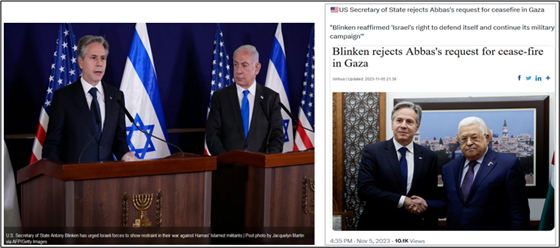
Arab countries demand an immediate ceasefire in Gaza but the US warns this would allow Hamas to regroup. US Secretary of State Antony Blinken had meeting with delegates from Egypt, Saudi, Qatar and Jordan in Amman – as he pushes for humanitarian pauses in the fighting. But Israeli PM Benjamin Netanyahu said there will be no temporary ceasefire with Hamas in Gaza until all Israeli hostages are released.
After the Amman meeting, Antony Blinken visited the administrative center of Palestine, the city of Ramallah, meeting with Mahmoud Abbas; then he went on a visit to Baghdad, where he held negotiations with representatives of the political leadership of Iraq; on November 6, he visited Ankara, where he met with Turkish Foreign Minister Hakan Fidan.
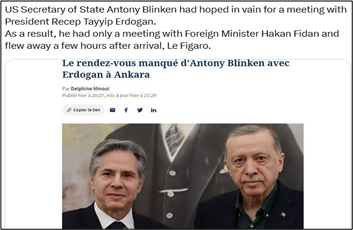
Blinken’s tour was not going well, the dissonance in the messages was evident in all media conferences after meetings. In Israel, Prime Minister Netanyahu even refused to appear with Blinken to the media conference following their meeting. Blinken met alone with reporters after closed-door talks with Netanyahu.
AP News and number of other news agencies making headlines “Protest marches from US to Berlin call for immediate halt to Israeli bombing of Gaza”. Israel’s attacks in Gaza, while being tolerated in the West, are having the opposite effect in the rest of the world. The bombings causing collateral damage among Palestinian civilians are fueling a deepening outrage outside of the West and turning many nations, that had reasonably strong relations with Israel, against it.
Jeffrey Sachs, professor at Columbia University, gave some very important statements in the video below, interviewed by Judge Napolitano.

Prof. Jeffrey Sachs: How Israel is harming itself.
Judge Napolitano – Judging Freedom , November 1, 2023
Regional context – growing tension among players
Taking into account the wider regional context, one can ask “which parties are poised to intervene, if the Israel-Hamas war expands?”
The possibility that other parties will be drawn into the war has increasingly growing. The IDF has already exchanged fire with Iranian-aligned militias on its Syrian and Lebanese borders, with these seen as the primary areas, where longstanding hostilities could lead to an expansion of the war.
Iran, the Lebanese militia group and political party Hezbollah and to a lesser extent the Syrian government, are seen as those, which could intervene in the war against Israel, while the United States and Turkey are both potentially likely to intervene against Israel’s adversaries should the war expand.
Iran – key strategic regional player
Iran has managed to achieve an important position of a strategic player regionally, having strategic partnerships both with Russia and China, having massive oil and gas resources, sufficient military capability as well as sufficient population base with high education level.
Iran has given numerous severe warnings to Israel and the US. The possibility of Iranian intervention in a potential conflict cannot be discounted. Particularly, if the US involves itself directly in escalated clashes between Hezbollah and Israel.
Iranian air power and space assets in particular could play a major role in a conflict without requiring the deployment of ground forces, with the country’s drone fleet considered by far the most formidable in the region and deploying stealth designs that have proven capable of penetrating and loitering in Israeli air space.
Iran’s robust and significant anti shipping capabilities could seriously complicate operations for the US Navy. The Iranian ballistic missile arsenal is also by far the most formidable in the region and has a reach across all areas potentially affected by hostilities with high levels of precision demonstrated in the past in strikes against both American military bases and Turkish backed jihadist groups.
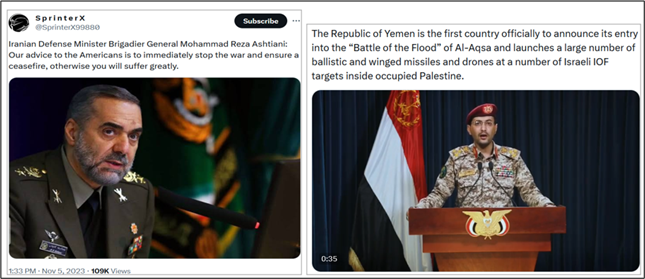
Yemen Houthi rebels, in the name of Republic of Yemen, declared the war with Israel at the end of October. The Houthis are Iranian proxies.
Soon in November, they launched a large rocket and drone attack on Israel using even ballistic missiles. IDF’s Iron Dome air defense intercepted a heavy Houthi ballistic missile aimed at Israel’s Red Sea port city of Eilat. An Israeli expert has confirmed it was shot down by Arrow 2 missile. While the Houthis have not said anything about the ballistic missile launch, they have acknowledged the drone attacks.
Israel has acknowledged that it “coordinated with foreign armies” in defeating the Houthi attack. These “foreign armies” most likely were either Saudi Arabian or Egyptian. All Houthi weapons come from Iran and Iran provides both operational support and tactical direction. This was the first time that Israel has been attacked by Houthi forces in Yemen. Houthis have used missiles and drones against Saudi Arabia, the UAE and Egypt.
Ismail Haniyeh, head of Hamas’s political office, visited Tehran in recent days and met and spoke with the leaders of Iran.
Iran President Ebrahim Raisi and Saudi Arabia Crown Prince Mohammed bin Salman had a phone call discussing Palestine, on October 11. This is their first phone call ever, which took place around 45 minutes. They discussed Muslim countries unity in the face of developments in Palestine.
Iranian Foreign Minister Hossein Amir-Abdollahian, as part of the continuation of regional consultations, spoke by telephone with Omani Foreign Minister Badr bin Hamad Al-Busaidi and discussed current events in Palestine. FM Amir-Abdollahian visited Iraq, Lebanon, Syria and Qatar to coordinate with the various resistance groups. Notably, he met Hezbollah leader Hassan Nasrallah in Beirut and Hamas leader Ismail Haniyeh in Doha.
The President of the Christian-Based “Lebanese Forces” Political Party in Lebanon, Samir Geagea has now called for Hezbollah to withdraw from the south of the country and return its control to the Lebanese Armed Forces; he further stated that if Hezbollah decides to enter the war in Israel, they will be committing a major crime against the Lebanese people.
Algerian parliament, by a 100% vote, officially authorized President Abdel Majid Tebboune to go to war with Israel. Strong pro-Palestine messages have been sent nearly all Arab countries.
Late October, Joint Statement by 9 Arab nations: Bahrain, Egypt, Jordan, Kuwait, Morocco, Oman, Qatar, Saudi Arabia and the UAE have issued a joint statement condemning the targeting of civilians and violations of international law in Gaza and that self-defence does not justify neglecting the rights of the Palestinian people.
Hezbollah affair
Since Hamas carried out the October 7 attacks on Israel, Lebanon has been on edge, closely watching Hezbollah. The group has intensified its attacks on Israel, which is retaliating. But both sides have apparently taken steps to avoid a dangerous escalation and most strikes have been limited to the border area.
Speech of Hassan Nasrallah, the leader of the Lebanese Shia Islamist group Hezbollah, is addressing his followers, on November 3, in his first public statement, since the Israel-Hamas war broke out. Here the link to the YouTube video (1h 22min):
Hezbollah chief Hassan Nasrallah gives Gaza speech
Al Jazeera English, November 4, 2023
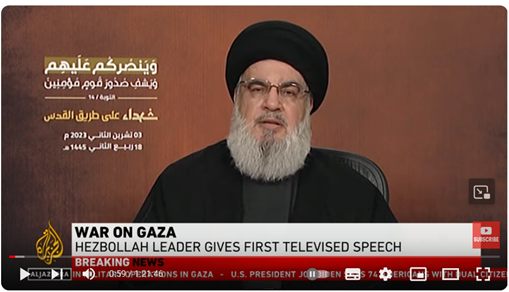
The whole secret lies in confusing the enemy, so that he cannot fathom our real intent – Sun Tzu
Key points from Nasrallah’s speech:
- Hamas operation was an independent decision and implementation by Palestinians, no engagement of Hezbollah or Iran
- Hezbollah has entered the war (not an official declaration of war), the intensity depends on Israeli behavior toward Lebanon and how the situation develops in Gaza.
- In case of a regional war, US ships and the regional military bases will pay a heavy price
- Preparations have been made to destroy all US naval assets
- Yemen and Iraqi forces will intensify their attacks on US and Israeli assets
- USA should remember its humiliating defeats in Lebanon, Syria, Iraq and Afghanistan
Conclusions from the speech:
Hezbollah is unlikely to escalate and will continue the same tit for tat attacks against Israel. They want de-escalation and do not want to be further involved, at least not yet. The operation proves that decisions of the resistance factions are in the hands of the respective leaders. The Islamic Republic of Iran had no say in this. Any preemptive attack on Lebanon will be responded to. All options on our front are on the table. They can be decided anytime. The whole purpose of Nasrallah’s speech was to confuse the opponents, not to reveal Hezbollah’s further plans and to keep the pressure on Israel and the West.
NATO member Turkey and affiliated militia groups
After hostilities began on October 7, The United States moved quickly to increase its military presence in the Middle East. The other NATO member Turkey with a very large military presence in the Middle East, is also considered likely to potentially intervene should the war escalate.
Turkey is the only state actor to have engaged in combat operations against Hezbollah since the 1980s, and continues to place northern Syria’s Idlib governate under its influence through support for a wide range of jihadist insurgent groups such as the Al Nusra Front and East Turkestan Islamic Party. These militias were at the forefront of Turkish and Western efforts to overthrow the Syrian government in the 2010s, which Hezbollah and later Iran and Russia intervened to thwart. These terrorist militias have since 2011 had Turkish special forces embedded within their ranks.
The danger from Turkey and the militant groups under its influence is thus a further serious constraint on Syria, Hezbollah and other parties’ ability to act – besides the presence of American carrier groups.
Despite the positioning of multiple actors to intervene on either side of the war, however, a significant possibility also remains that hostilities will remain confined to territories claimed by Israel and Hamas, with the substantial arsenals built up by major parties on both sides serving as potent deterrents to intervention.
Israel and trilateral negotiations
The flare-up by Hamas comes at a time of very delicate diplomatic process and a moment of weakness for Israel that analysts have been warning its enemies might seek to exploit.
Israel is in negotiations with the US and Saudi Arabia on a complex three-way deal, in which Washington would offer security guarantees to Riyadh. The Saudis, for their part, would normalize relations with Israel. Israel has also been talking with Turkey and others about gas exports to Europe along with corridors for trade from Asia.
Internally, Israel has been embroiled in political turmoil that left it vulnerable. Last April, the nation found itself briefly engaged on three fronts simultaneously — Gaza, Lebanon and Syria — after rocket fire came from all three. Prime Minister Netanyahu, amid the anti-government demonstrations, will likely find a moment of national unity after the Hamas attack, leading opposition politicians to back a strong response.
Part of the Saudi deal is expected to involve Israeli concessions in the West Bank to strengthen the Palestinian Authority and add to the possibility of an independent Palestinian state. That arrangement will now be in jeopardy should the latest fighting lead Israel to extend its operation into the West Bank. Saudi Arabia wants US protection assurances partly because of its own concerns about Iran. If Iran is shown to be playing a key role in Saturday’s attack on Israel, that could affect those negotiations.
Adding to the pressure on Netanyahu, the attack is being widely described as the worst failure of Israeli security system since Syria and Egypt launched an unexpected war on the country 50 years ago. The issue now is, how the confrontation escalates.
“History doesn’t repeat itself but it often rhymes”
On the eve of the 50th anniversary of the world’s first oil crisis, the parallels between October 2023 and October 1973 are easy to draw: A surprise attack on Israel and oil prices rising. But the resemblance ends there.
The Israel-Hamas war is a multifaceted battle that has significant ramifications for the geopolitical dynamics around oil in the Middle East. Although Israel and Palestine are not major oil producers, there is a possibility of escalation that impacts the overall prospects of the Middle East.
The Middle East region plays a significant role in the worldwide supply of oil and gas, contributing around 40% of the world’s oil output and 20% of the world’s gas production. The geographical region is also home to several significant oil transportation passages, including the Strait of Hormuz, the Suez Canal, and the Bab el-Mandeb Strait. These passages serve as crucial links connecting the Persian Gulf, the Red Sea, and the Mediterranean Sea.
The India-Middle East-Europe Economic Corridor (IMEC) via Dubai-Saudi-Israel was launched last month on the sidelines of the G20 Summit in New Delhi is effectively dead, writes Indian ‘Business Today’. Hamas’ attack on Israel and subsequent response by Tel Aviv can reverse some of the ambitious initiatives in the Middle East. The US has been pushing for normalization of the relationship between Saudi Arabia and Israel and an economic corridor from India to Europe that will pass through the Middle East. The fate of these two now hangs in balance.
In conclusion, the Israel-Hamas war is a serious threat to regional stability and security, as well as to global oil markets. The outcome of the war will depend on many factors, such as the diplomatic efforts of the international community, the military capabilities and strategies of both sides and the public opinion and reactions of other countries in the region. The war could have significant consequences for the geopolitics of oil in the Middle East, which is already a volatile and complex region.
Positions of great powers, international framework
Position of the US and American military measures
Position of the Biden administration and thus the confirmed US stance, is very clear. The scope of Hamas’s attack against Israel was unprecedented and the US response reflects that. “In this moment, we must be crystal clear,” US President Joe Biden said on October 12. “We stand with Israel and we will make sure Israel has what it needs to take care of its citizens, defend itself, and respond to this attack.”
The United States moved quickly after hostilities began to increase its military presence in the Middle East: on October 11 the US Navy’s nuclear-powered supercarrier the USS Gerald R. Ford was been deployed with its strike group within range of operations in Israel. The Pentagon simultaneously took steps to augment US Air Force F-35, F-15, F-16, and A-10 fighter and attack jet squadrons in the region.
Seeking to further its ability to intervene rapidly should parties beyond Hamas intervene against Israel, on October 14 the Pentagon announced that a second nuclear powered aircraft carrier, the USS Dwight D. Eisenhower, would be deployed to the region alongside two Arleigh Burke Class destroyers and nine squadrons of military aircraft.
Commander of the US Central Command General Erik Kurilla provided important insight into the purpose of the deployment, stating: “The arrival of these highly capable forces to the region is a strong signal of deterrence should any actor hostile to Israel consider trying to take advantage of this situation.”
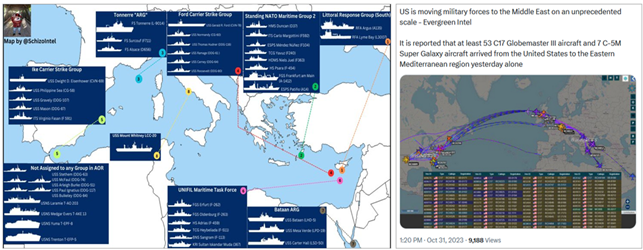
The USS Dwight D. Eisenhower carrier strike group has transited the Straits of Gibraltar and is racing to join the USS Gerald R. Ford CSG in the eastern Mediterranean.
Two American carrier strike groups have arrived the eastern Mediterranean. The US/NATO have assembled a fleet of no fewer than 73 ships, including the 30+ NATO ships taking part in the Dynamic Mariner exercises off the coast of Italy. This is the largest US/NATO assemblage of warships in at least the past half-century. There are also undoubtedly a large number of submarines present, each one of which packs substantial stand-off firepower.
This fleet is not being assembled in order to assist the Israelis in their ongoing project to destroy HAMAS and the 2.5 million inhabitants of Gaza. Obviously, this powerful fleet can have only one possible mission: to eradicate all Russian, Iranian, and Iranian-affiliated military power currently present in Syria, Lebanon and Iraq.
In addition, the US is moving military forces and material to the Middle East on an unprecedented scale, tens of large military cargo aircraft have been shuttling between the US and Eastern Mediterranean region daily. USAF KC-135 tanker aircraft have arrived in the Middle East and their location indicators have been removed. Is the US preparing for a big war in the Middle East and with whom?
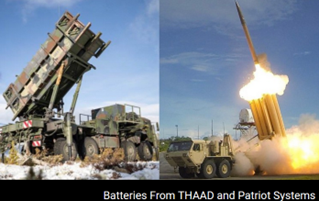
Pentagon announced on October 21 that the US had deployed new high and medium altitude air defense systems to the Middle East. Defense Secretary Lloyd Austin stated that the military had “activated the deployment of a THAAD battery as well as additional Patriot battalions” in several undisclosed locations in the Middle East to increase the protection of US forces and to provide greater support for Israel.
The US military has been providing military aid, including bombs and artillery rounds, to Israel and has a dozen air defense systems and hundreds of troops to the Middle East since the outbreak of the war in Gaza. Moreover, several dozen American commandos were dispatched to Israel, allegedly to help advise on hostage recovery efforts. US combat drones are also operating over Gaza, allegedly to locate hostages.
The US unconditional support for Israel has caused a serious backlash in the Middle East. American forces in Iraq and Syria have been attacked with drones or rockets at least 27 times over the past two weeks, the Pentagon said on October 31. During a press briefing, Pentagon press secretary Brigadier General Pat Ryder said that 16 of these attacks took place in Iraq and 11 in Syria. At least six of these attacks were carried out, three in Iraq and three in Syria, after U.S. forces struck on October 26 two facilities in the eastern Syria governorate of Deir Ezzor used by Iran’s Islamic Revolutionary Guard Corps and affiliated groups. More escalation in the region is to be expected.
The United States has reportedly deployed special operations forces for joint offensives with the Israeli Defence Forces against the Gaza based Palestinian militia Hamas. Retired US Army Colonel Douglas MacGregor, speaking to talk show host Tucker Carlson, reported on October 25 regarding to this effect: “In the last 24 hours or so, some of our Special Ops forces and Israeli Special Ops forces went into Gaza to reconnoiter, to plan for where they might want to go to free hostages and make an impact, and they were shot to pieces and took heavy losses, as I understand it.”
The US is raising deterrence to Iran by sending an Ohio-class nuclear-powered attack submarine to the Mediterranean Sea, obviously equipped with nuclear missiles. At the same time, William Burns, the director of CIA is visiting Tel Aviv. Stakes are getting higher and higher.
In mid-October, top Western officials rush to Middle East in effort to stop Israel-Hamas war from spreading. US and EU leaders insist they stand with Israel even amid growing calls for restraint in the Gaza Strip.
French President Emmanuel Macron and US Secretary of State Antony Blinken have urged Israeli forces to show restraint in their war against Hamas’ Islamist militants. Some European officials have gone further, with top EU diplomat Josep Borrell saying Israel had broken international law by cutting off food and water from the Gaza Strip, and criticizing the order to evacuate civilians from the blockaded area as “unrealistic.”
But the main message from US and European officials was still one of steadfast support for Israel. Top European officials like European Commission President Ursula von der Leyen and Parliament chief Roberta Metsola, who also visited Jerusalem struck a similar note of solidarity with Israel.
The bloc’s diplomatic efforts have been under fire after Brussels did a U-turn on suspending EU aid for the Palestinians. Adding to the confusion is an apparent difference in views between Borrell, who said Israel was breaking international law while other senior EU figures who have steered clear of making that claim.
Position of Russia
Russia’s position and viewpoint can be encapsulated by Putin’s statement, on October 13: Israel has right to defend itself but independent Palestine state must be created. Israel has been brutally attacked but a settlement will be possible only through the establishment of an independent Palestine. Russia proceeds “from the postulate a negotiated solution to the Palestinian-Israeli conflict has no alternatives.”
Russia hopes that, after the end of the burning phase of the conflict in the Middle East, everyone will take seriously the obligation and fulfillment of the UN resolution on the creation of a Palestinian state, said the Foreign Minister Sergey Lavrov, on October 12. Lavrov, Russia’s UN representatives and other diplomats have intensive rounds of discussions behind the scenes regarding the situation in the Middle East.
Israel-Gaza conflict means an opportunity for Russia. A rival crisis disrupting the supply of weapons to Kyiv is just, what Russia needs to continue the Ukraine invasion. Time is an ally of Russia in the Ukrainian conflict; Russia only needs to reduce its rate of battlefield deaths and remain militarily active in Ukraine for as long as possible. The conflict could divert significantly American military equipment shipments to the Middle East rather than to Ukraine. How large the diversion of arms is, depends upon the war situation.
The diplomatic picture for Russia towards the Israel-Hamas conflict is multidimensional. Russia has historically been friendly towards Israel. Israel has mirrored this by toning down any criticism it has made of the Ukrainian invasion.
Russia has recently become friendlier towards Iran as it has sought to buy military equipment. But Iran is likely to be the source of the military equipment used by Hamas to overwhelm Israel’s Iron Dome air defense system and to invade the country. Iran is also the likely source of counterintelligence techniques that have enabled Hamas to avoid attention from the capable Israeli intelligence services. Russia has been active in selling intelligence techniques around the world and so Iranian counterintelligence is likely informed by Russian systems.
Russia has long operated multilevel diplomacy – managing to maintain positive relationships with competing and even warring nations – in the Middle East, and will continue to do so. It is unlikely to find disadvantage here. Russia is a beneficiary of the conflict and upheaval in Israel and Gaza. Putin does not need to have caused the uptick in tension but he will not be disappointed to see it escalate over the coming weeks and months.
Russian military presence in the region consists mainly of two heavy military bases in Syria, the naval base in Tartus and the air force base Khmeimim, near Latakia. A possible naval base located in Libya is under negotiations with Libyan Marshal Haftar.
Tartus naval group consists of a missile cruiser, missile corvettes, anti-submarine ships, mine sweepers and various auxiliary ships as well as some submarines. Air force group is made up of Su-34, Su-24 and 25, MiG-31K, TU-22 bombers as well as numerous helicopters and cargo planes.
Russian President Vladimir Putin announced on October 18 that he had ordered MiG-31K/I strike fighters armed with Kh-47M2 Kinzhal hypersonic ballistic missiles to carry out regular patrols over neutral airspace in the Black Sea. “Our MiG-31 planes are armed with Kinzhal missile systems. It is known that they have a range of over 1,000 km and a Mach-9 speed,” he stated, emphasizing that the deployment was a reaction to escalating instability in the Middle East. In particular, the US Navy’s deployment of two aircraft carrier strike groups to the Mediterranean Sea near Israel was raised as a factor. The MiG-31s will place the Eastern Mediterranean within striking distance of the hypersonic weapons carried by the aircraft.
Reach of Russian missile systems in the Eastern Mediterranean.
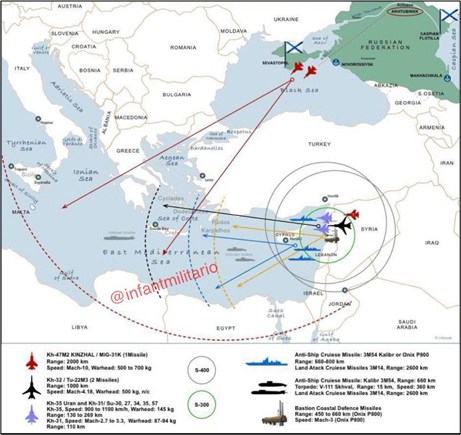
Position of China
China sees that, regarding the bloody conflict between Israel and Palestine, voices calling for restraint or a cease-fire are hard to find in Washington. On the contrary, the US is filled with inflammatory, reckless and crazy talks. While China emphasizes a solution, specifically the “two-state solution”, the US is sending an aircraft carrier strike group to the Mediterranean to be Israel’s cheer leader and is exploiting the conflict by spreading bizarre rhetoric.
The Israeli-Palestinian conflict is now at a critical juncture facing a serious escalation but the US does not show the slightest intention to promote a de-escalation of the situation; it is provoking an escalated slaughter.
China has no self-interest in the Palestinian question and has always stood on the side of peace and justice. China sincerely hopes for peaceful coexistence between Israel and Palestine and is willing to work with the international community to promote peace and create conditions for its realization.
Chinese observers warned a humanitarian crisis in the region is unavoidable if the fighting between Hamas and Israel doesn’t stop. At this juncture, the US, which can exert real influence on Israel, is instead stoking more tension in the Middle East. China’s special envoy on the Middle East issue Zhai Jun, who will visit the relevant countries in the region in the near future, held a series of phone calls with the foreign ministers of Palestine, Israel, Egypt, Saudi Arabia, and other Middle Eastern countries to discuss the current situation, stressing that the fundamental solution to the Israeli-Palestinian conflict lies in implementing the two-state solution.
Chinese Foreign Minister Wang Yi had a phone conversation with Iran’s Minister of Foreign Affairs Hossein Amir-Abdollahian. During the call Wang said the immediate priority is to de-escalate the situation and prevent a severe humanitarian crisis in the Gaza Strip.
In his phone call with Saudi Foreign Minister Prince Faisal bin Farhan Al Saud on Saturday, Wang said China opposes and condemns all acts that harm civilians, as they violate basic human conscience and the fundamental principles of international law.
Chinese experts consider that from a global perspective, the US is losing its power position in the Middle East and losing ground on a moral front, given it has long championed itself as having values based foreign policy. Now with the blatant display of a double standard, the US has undermined its own credibility. Furthermore, from a geopolitical perspective, the US’ involvement in the Israeli-Palestinian conflict is affecting its global strategy, either in its support for Ukraine in the Russia-Ukraine conflict or efforts to contain China in the Asia-Pacific region.
Naval operations, October – early November
The 44th Chinese naval escort taskforce has completed its visits to four Middle Eastern countries including Oman, Kuwait, Qatar and the UAE. The Chinese taskforce conducted joint maritime exercises, including joint search and rescue and formation maneuver with the navies of host countries.
A comprehensive drill of rescuing hijacked merchant ships by force at sea was wrapped up on October 25, 2023, marking a successfully ending of the China-Saudi Arabia “Blue Sword-2023” naval special operations joint training. The participants from both sides had two weeks of basic training and specialized training since October 9. They will carry out training on rescue, reconnaissance and support, focusing on courses such as fast-roping from helicopter, tactical group training, climbing warships, drone operation, observation device operation, and ship-to-sea firing. The Chinese side has dispatched a landing ship with two helicopters to participate in the joint maritime training.
The “Blue Sword-2023” marked the 2nd joint training between Chinese and Saudi Arabian navies. The participants from both sides engaged in 24 training subjects including fast rope, ship climbing, UAV operation, and anti-sea shooting.

Amid Israel-Hamas War, China Sends 6 Warships in West Asia |
Vantage with Palki Sharma, Firstpost , October 30, 2023
The Western public, especially the Americans, while focused intensely on the Israeli war with Hamas and the Palestinian people, is paying little attention to what China and Russia are doing in the region to support Iran. There is strong sentiment among the political class in the United States to take advantage of this moment and attack Iran.
What they are failing to take into account is that China, using a flotilla of its navy, sent a clear signal that it is no longer a passive observer in the war between Israel and Hamas. Six Chinese war ships sailed into the Persian Gulf, spending five days in Kuwait, and then sailed south to Oman. Following their visit to the port of Muscat, the Chinese ships raised anchors and sailed into the Arabian Sea, destination unknown.
This is not a sudden, spur of the moment initiative. China and Russia have conducted four joint military exercises with Iran since 2019. China and Russia were warning the West that they would not allow the West to attack Iran or shutdown oil exports from Saudi Arabia and Iran destined for China.
Conclusions
Since the Six Day War between Israel and its Arab neighbors in 1973, the United States has dominated the diplomatic agenda in the Middle East. Now, that 60 years era is ended. China and Russia have emerged as players at the diplomatic table and are challenging the United States’ status as the primary voice in trying to contain the war between Israel and Hamas.
The factual proof of this development was a failed mission to the Middle East, just completed by US Secretary of State Antony Blinken. He made rounds of meetings: Israel, Jordan, Egypt and Saudi Arabia. Meeting with Netanyahu was difficult, while the Egyptians received Blinken but the reception has been described as “cool.” Egypt listened but made no commitment to do what Washington wants.
The trip to Saudi Arabia was a debacle. Blinken was supposed to meet with Saudi Crown Prince and Prime Minister Mohammed bin Salman (MBS) Saturday night but MBS humiliated Blinken postponing the meeting to Sunday morning. They formally and correctly agreed on general views regarding the war situation but bin Salman delivered an unmistakable message — the United States is not a priority and is not taken seriously.
The Saudis realize that the United States, while still capable of projecting some military force in the region, is weak and not to be trusted. China and Russia are emerging new powers in the region and these two countries are providing a rally point for the Arab and Muslim world. China is emerging as a diplomatic power challenging US leadership.
Putting two of the eleven US aircraft carriers in the Mediterranean is a dangerous move by Joe Biden. As long as those two battle groups are not involved in any offensive actions against Palestinians in Gaza, their mission will be confined to providing Israel a symbolic security blanket.
But if Biden orders them to take any kind of offensive action this will likely fuel a massive negative reaction in the Arab and Muslim world. It is politically very serious event, when Shia Iran and Sunni Saudi Arabia and Turkey come together to support the Palestinian cause. This is unprecedented in the 76 years history of Israel and the United States no longer has the political or economic clout to coerce the Arab and Muslim nations to submit to Washington’s demands. That is, what makes this situation so dangerous to western “rules based order”.


